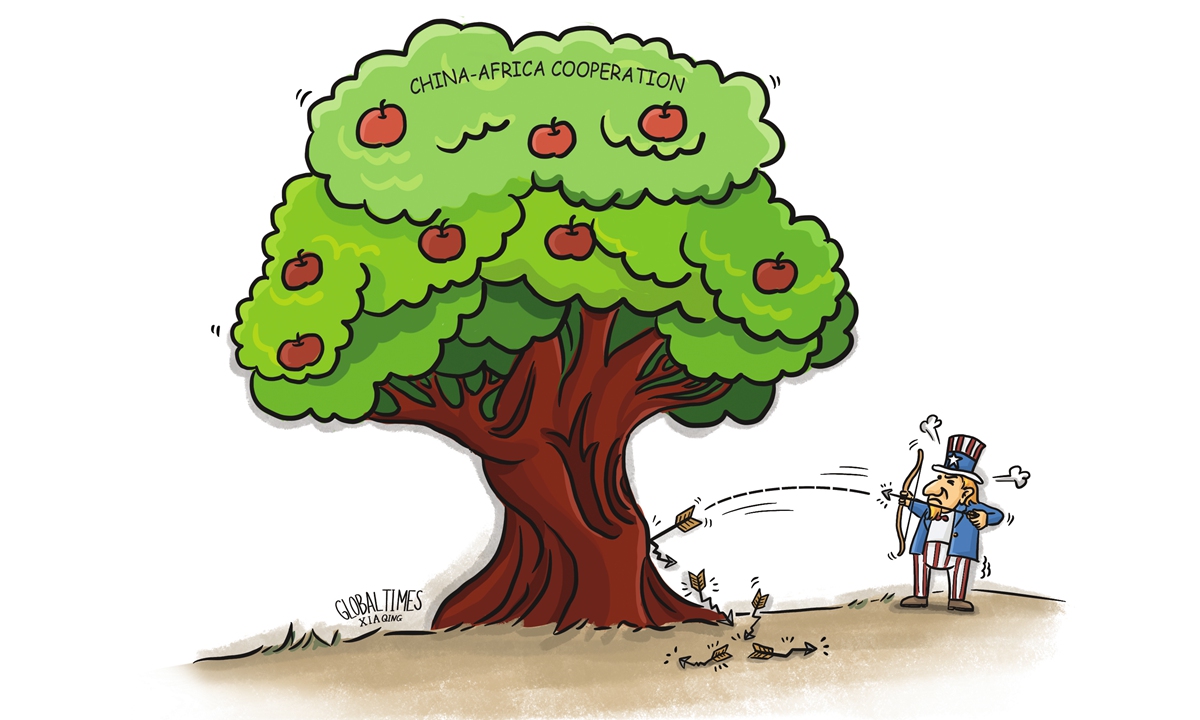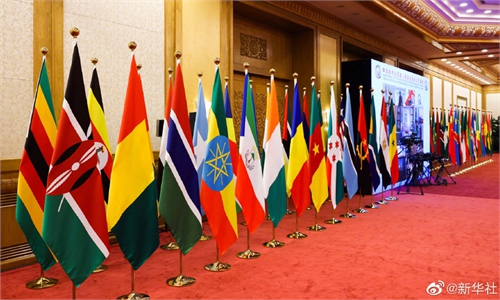COMMENTS / EXPERT ASSESSMENT
Time for the West to quit vilifying China-Africa cooperation

Illustration: Xia Qing/Global Times
Ugandan President Yoweri Museveni recently pointed out in a media interview the distinct differences between investment from China and from the West: Western companies are blind to Ugandan investments while Chinese private investment in the country is growing.
Uganda was working to sign a number of deals with Chinese private sector lenders across agricultural-processing, fertilizer-processing, minerals processing and textiles, Reuters reported, citing Museveni.
"The Western companies have lost their spectacles; they no longer have the eyes to see opportunities," Museveni said.
The interview came after a new round of vilification launched by the West over cooperation between China and Uganda. By hyping up the groundless "debt trap" rhetoric again, some Western media reports said that Uganda's international airport was under risk of being "taken over" by Chinese lenders after it had failed to make a repayment. It has been refuted by related departments from both sides, and Museveni again clarified that "there is no problem [with the repayment], they will be paid."
The difference between investment from China and the West in Uganda is not a single case. The truth is, though the US and other rich Western countries have been attempting to boost investment in African countries in a bid to counter China, Western companies do not have an appetite for less-developed countries and regions.
Comparing to the still emerging business environment in African and other developing countries, Western multinationals prefer mature markets in Europe and other places where predictable and short-cycled returns will be delivered.
Chinese companies, with a shorter history of exploring overseas markets compared to Western firms, choose to pay more attention to blue ocean markets with far-reaching designs. While much more importantly and different from the West in essence, Chinese capital has been put to work in African countries based on mutual respect with an aim to boost sustainable development of local economies.
As for specific projects, the cooperation between China and African countries is focused on long-term profitability of the projects, meaning that both sides benefit.
If any repayment difficulties emerge, Chinese creditors would work with related parties and try to find a workable solution, rather than moving to "take over" others' assets which, in fact, has been the exact colonialist mentality adopted by the West. The underlying logic is simple and clear that the Export-Import Bank of China, creditor of Uganda's sole international airport, provides two preferential facilities, namely, government concessional loans and preferential export buyers' credit, both of which require sovereign guarantee, instead of a property guarantee.
Not a single China-Africa cooperation project has been "taken over" or "confiscated" by China due to debt problems, Wang Wenbin, spokesperson for China's Foreign Ministry, said on November 29 in response to the West's vilification, noting that the so-called allegation that China's financial institution will seize and take over Uganda's project and assets is nothing but ill-intentioned speculation that has no factual grounds.
In contrast, Western countries have a much longer history of "aiding" the development of Africa than China does. Instead of facilitating the industrialization of the African continent, they simply plunder resources from the continent to serve their own interests.
African and other developing countries know exactly which model for cooperation is in their own interest. Based on a record of success, the China-Africa Cooperation Vision 2035 was recently announced with nine programs, including China planning to encourage its enterprises to invest no less than $10 billion in Africa in the next three years. The promising prospects for China-Africa cooperation is plain for all to see.
As for the US and other Western countries, instead of keeping yelling about groundless "debt trap" rhetoric, what they really should do is to provide practical support to the developing countries based on their core interests, rather than the West's hegemonic agenda.
The article was compiled based on an interview with Song Wei, a research fellow at the Chinese Academy of International Trade and Economic Cooperation. bizopinion@globaltimes.com.cn



